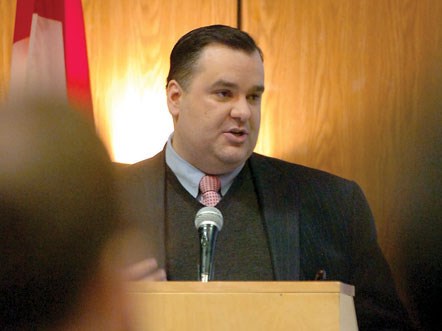University of Northern B.C.'s alumni association is standing by its decision to nominate former federal cabinet minister James Moore as its next chancellor.
"We are very excited about James' ability to advance the university going into the next 25 years," said Andrew Seabrook, alumni board president. "It's such a great opportunity to showcase the successes of one of our own alumni and with him being a grad, he's very motivated and excited himself about that advancement of UNBC."
Seabrook said he was surprised by the backlash but echoed Board of Governors chair Ryan Matheson's comment that discussion is a healthy part of the institution.
"Nobody would have expected it to get to this extent. It definitely wasn't anticipated but it's good, I guess. That's all part of the university world, is having that dialogue and sharing of opinions. We recognize that it's not all a bad thing to be having these different conversations."
An online petition to reverse the three-year appointment had almost 1,300 signatures by Tuesday afternoon to oust Moore, now a senior business advisor at the international law firm Dentons who would start his term as UNBC's first alumni chancellor in May 2016.
The University's Act's guidelines say the chancellor "is to be appointed by the board on nomination by the alumni association after consultation with the senate."
While some have questioned whether the timing is appropriate – Moore said he wouldn't seek re-election in a June 19 Facebook post – Seabrook and Matheson said that's not the case.
"We followed the process as we should have," Seabrook said. "We definitely didn't have any conversations that we weren't supposed to have at different points in time. There's no concern there for me."
Matheson said a task force started meeting long before the call for nominations officially opened in December and the alumni association recommended Moore to the senate and board. Seabrook said it considered many names.
"This past summer it started to work its way through all the different university bodies for final approval last month," Seabrook said.
Matheson doesn't see a conflict with the board's bylaws, which say the chancellor can't be an MP, among other guidelines.
"From what we understand – and we've looked into this as well – he cannot be a member of Parliament and a chancellor simultaneously. Through the process of nomination he was no longer there," Matheson said. "He's a very fair and honest person and he would have to clear it through the government at that time. We wouldn't have done anything had he been running again, had he been a member of Parliament."
Seabrook said he couldn't say whether the alumni association spoke to Moore before June.
"I won't speak to that, but not officially no," Seabrook said. "In the position he was in, he was fully committed to his role (as MP) and unable to speak to anything until he retired from his position in Parliament."
For the faculty association, it's more of a question of consultation.
"To me the big issue is whether the Board of Governors understands its duty to consult widely on this sort of thing," said Stephen Rader, association president. "It's a very public symbol for the university, the chancellor is very much in the public eye so you want somebody who really represents the university's values."
Paul Siakaluk, associate professor of psychology and a member of the university senate, said the appointment followed the University Act's direction to consult senators. Siakaluk said he first learned of the appointment in an in-camera meeting in October, but there may have been other faculty that knew of the nomination.
Siakaluk said the question of nomination timing would likely come up at the next senate meeting.
In a letter to the editor, the chair of UNBC's political science department questioned if a difference in politics is permitted at the institution.
"Some of our students are Conservative supporters. Many of them are personally conservative," Prof. Boris DeWiel wrote. "In the last federal election, close to a third (31.9 per cent) of Canadians voted for the Conservatives. Are they still welcome at UNBC?"
Rader said a chancellor should be "a non-partisan, non-political position." In an interview after his appointment last Thursday, Moore echoed that sentiment.
"You would like that that person, rather than reflecting the local politics, to reflect the values of the university and the university community," Rader said.
"The university has branded itself as Canada's green university. It's a pretty unambiguous statement of values around environmentalism and sustainability and so on and (Stephen) Harper's government's position on those things was pretty much diametrically opposite so it's really hard to see how anybody could feel that somebody who's associated with those views could be a good representative for the university."



